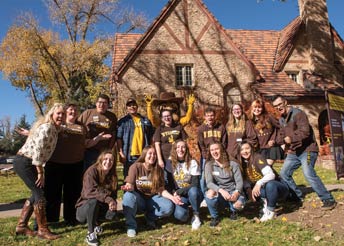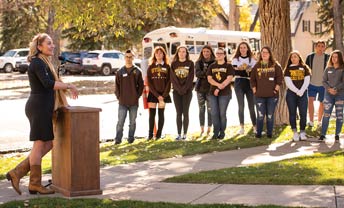
Contact Us
Institutional Communications
Bureau of Mines Building, Room 137
Laramie, WY 82071
Phone: (307) 766-2929
Email: cbaldwin@uwyo.edu
Fostering Student Success
Published January 24, 2022

Dean of Student Success and Graduation Nycole Courtney (far left) poses with Cowboy
Coaches at the opening of the Student Success and Graduation Hub.
New programming aims to help students transition, stay in college and graduate on time.
By Micaela Myers
Enrolling in college marks a first step toward success. Ahead lie many years of hard work before graduates can toss their hats in the air. According to the National Center for Education Statistics, six-year graduation rates at public institutions are only about 60 percent—and much lower at private for-profit institutions. Graduating on time saves students money and lets them enter the workforce sooner. The University of Wyoming is taking an all-hands-on-deck approach to student retention, success and timely graduation.
“We’re in the middle of a considerable culture shift at UW, really making university-wide global strides,” says Dean of Student Success and Graduation Nycole Courtney. “It’s a global effort to really shift our focus to reduce barriers and provide success for all of our students from the moment they decide to come here through graduation.”
Two new programs will add to these efforts.
Saddle Up College Prep
High school students entering college soon learn that it comes with a very different pace and expectations. While existing programs such as Cowboy Connect aim to welcome students with a fun few days of activities, the new Saddle Up college preparation program will help prepare them academically while providing connection and mentorship.
As part of Saddle Up, incoming freshmen will move in a week early. They’ll be assigned to Poke Pack groups based on their chosen colleges or exploratory tracks. Each small pack will have an upperclassman Cowboy Coach mentor. Together, they’ll experience a one-unit academic class complete with midterm plus advising and tutoring. They’ll learn about campus resources, time management, wellness offerings and explore their career trajectory as they bond together.
Anne Alexander, vice provost for strategic planning and initiatives, says organizers based the college preparation camp on a successful program from University of Nevada – Reno, where it produced a 7-10 percent increase in retention. “They have a very similar student population, so that’s very promising,” she says.
Vice Provost for Undergraduate Education Steven Barrett believes that the mini-midterm is one of the key components. “The whole idea is to get them ready for what that midterm week is going to be like and how to prepare,” he says. The mini-midterm will be graded, and the professor will provide feedback to each student.
“Saddle Up really sets a rigorous fun environment that’s also helping students find connections, create a sense of belonging, find new friends, explore a major, and make learning adjustments before the start of the semester,” Courtney says. “It’s also helping to grow and foster our Cowboy Coaches peer-to-peer mentoring program.”
The coaches, all UW students themselves, will be there for the new freshmen well after Saddle Up ends, and students can come to their coaches with all manner of questions and concerns. The coaching program includes weekly emails on timely topics and ways to get involved.
“That coach is there for them for the majority of their career at the institution, so we’re building that foundation,” Courtney says.
Physiology and honors junior Danielle Ernste of Cheyenne, Wyo., is one of the Cowboy Coaches team leads. “The list of ways that this program will benefit freshmen is endless,” she says. “It will kick-start how freshmen begin to make friends at the university, give them opportunities to experience lecture-style classes before school even begins, and let them experience what it means to be a cowboy the second they get here.”
Another team lead, political science master’s student John Houghton of Modesto, Calif., loves making a difference in the lives of new students and helping them feel welcome. He believes the program will help coaches develop strong relationships with their mentees. “Saddle Up will provide countless opportunities for students to connect with their colleges, learn new skills and make plenty of friends along the way,” he says. “It will also help us begin to make yearlong connections, ensuring students will have all the help they’ll need throughout the year.”
Political science and gender and women’s studies senior Riley Talamantes of Whittier, Calif., works as a project coordinator for the Cowboy Coaches program. “As a first-year student, it can be difficult to adjust to college life, keep track of classes and learn to take care of yourself,” she says. “Cowboy coaching is a great way for students to ask a peer how to navigate their first year of college and is a meaningful way for students to know that the institution truly cares for them.”
Talamantes says that, by moving in a week early, freshmen can gradually get settled and focus on information provided before all the other students return. “What makes me most excited about this program is the opportunity for students to learn skillsets that will be important for them during their college career, such as health and wellness, time management, study skills for difficult core classes and more,” she says. “I truly wish I had a program like this my freshmen year.”
Parents are also a key part of student success, and Courtney’s office is creating a student-family council, communicating with parents via email and inviting families to a send-off ceremony as part of the early move in and drop off. A mini-version of Saddle Up is also in the works for transfer students.
“It can be challenging when you’re coming from a small community college or community,” Courtney says. “You can feel isolated or like you don’t belong. This is going to help that population feel connected to campus.”

Vice President for Student Affairs Kimberly Chestnut speaks at the grand opening
for “U-Dub Hub”—the UW Student Success and Graduation Hub—in October.
Navigating to Success
Technology also plays a key role in student success efforts via the new Navigate program, which streamlines student scheduling, advising and information for UW personnel and the students.
“We had 15–20 software applications we were using,” Barrett says. “Navigate replaces a lot of those and integrates a lot of the others. In my mind, it provides a user-friendly interface so we can mine the data to help students and connect them with scheduling and advising. The goal of Navigate and Saddle Up are the same: We want to improve retention and degree completion.”
Students can view their schedules, schedule appointments and connect with friends on the platform, among other things. If they’re struggling in a class, the professor can reach out to them and connect them with resources.
Approximately 47 percent of all students at around 850 colleges across the country are now using Navigate, Alexander says. “Those institutions have seen a pretty significant increase in retention and graduation rates. It’s a great combination of using our own data with technology that helps us identify early markers of success and pathways for students. It allows the entire advising team to share core information and help make sure students stay on a path to success. It’s tailored to what students need and customizable.”
Advisers began using Navigate this winter. The platform takes advising from an occasional appointment and makes key information and options always accessible at a student’s fingertips. It also allows for easy reminders to students about deadlines and to-dos.
“Navigate helps us make data-driven decisions,” Courtney says. “It will help us come up with ways to understand students who are at risk and get to the nuances of retention. We’re doing a lot of assessments and really listening to constituents to close gaps and eliminate barriers.”
In addition, the Student Success and Graduation Hub opened in the Alumni House in October. The hub offers a one-stop shop aimed at helping students as they transition into college, enabling them to remain in college by connecting them with appropriate resources and helping ensure they graduate in a timely manner.
You can learn more at uwyo.edu/student-success.
Contact Us
Institutional Communications
Bureau of Mines Building, Room 137
Laramie, WY 82071
Phone: (307) 766-2929
Email: cbaldwin@uwyo.edu


